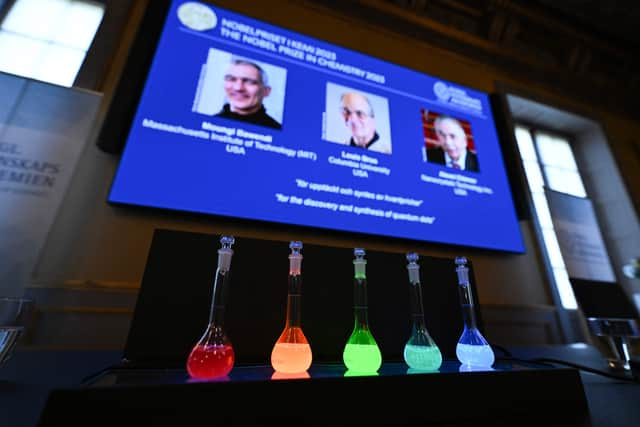Nobel Prize: three scientists share the prize in chemistry for their quantum dots discovery
and live on Freeview channel 276
Three scientists have won the Nobel Prize for chemistry in recognition of their work on tiny quantum dots.
The prize is shared equally between Moungi Bawendi, Louis Brus and Alexey Ekimov for discoveries on the unique properties of nano-materials, and how to make them, that paved the way for wide-ranging applications in consumer electronics, biochemistry and medicine.
Advertisement
Hide AdAdvertisement
Hide AdBawendi, of MIT, Brus, of Columbia University, and Ekimov, of Nanocrystals Technology, were honoured.


“These tiny particles have unique properties and now spread their light from television screens and LED lamps. They catalyse chemical reactions and their clear light can illuminate tumour tissue for a surgeon,” according to the Royal Swedish Academy of Sciences.
Hans Ellegren, the secretary-general of the Royal Swedish Academy of Sciences, announced the award on Wednesday morning in Stockholm.
The Nobel Prizes carry a cash award of 11 million Swedish kronor (£821,000). The money comes from a bequest left by the prize’s creator, Swedish inventor Alfred Nobel, who died in 1896.
Advertisement
Hide AdAdvertisement
Hide AdThe official announcement came after the three names were leaked in an email to a Swedish newspaper earlier on Wednesday morning, leading for the names to be released before the prize was awarded.
The Royal Swedish Academy of Sciences, which awards the physics, chemistry and economics prizes, asks for nominations a year in advance from thousands of university professors and other scholars around the world.
A committee for each prize then discusses candidates in a series of meetings throughout the year. At the end of the process, the committee presents one or more proposals to the full academy for a vote.
The deliberations, including the names of nominees other than the winners, are kept confidential for 50 years.
Advertisement
Hide AdAdvertisement
Hide AdOn Tuesday (3 October), the physics prize went to French-Swedish physicist Anne L’Huillier, French scientist Pierre Agostini and Hungarian-born Ferenc Krausz for producing the first split-second glimpse into the superfast world of spinning electrons.
The tiny part of each atom races around the centre and is fundamental to virtually everything: chemistry, physics, our bodies and our gadgets.
On Monday (2 October), Hungarian-American Katalin Kariko and American Drew Weissman won the Nobel Prize in medicine for discoveries that enabled the creation of mRNA vaccines against Covid-19.
The chemistry prize means the Nobel season has reached its halfway stage. The prizes in literature, peace and economics follow, with one announcement every weekday until 9 October.
Comment Guidelines
National World encourages reader discussion on our stories. User feedback, insights and back-and-forth exchanges add a rich layer of context to reporting. Please review our Community Guidelines before commenting.
